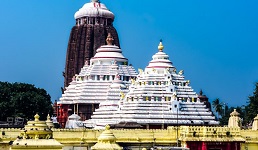The beautiful coastal city of Puri is located in Odisha, in the eastern region of India. It is one of the most popular tourist places in Odisha. The pleasant weather in the city during winter and the availability of famous sightseeing spots make it a go-to destination for family vacations, trips with friends, solo getaways and honeymoons. Puri is known for various things, like its pristine beaches, beautiful culture and traditions, delicious cuisine, grand festivals and so on. However, the most well-known aspect of Puri is that it is the h
me of the renowned Shree Jagannath Temple. It is one of India’s four original holy Hindu pilgrimage sites known as “Char Dham”. Devotees from all over India and the world refer to Puri as the Sri Jagannatha Dhama. The city is also a part of the “Krishna Pilgrimage Circuit”, alongside places like Gokula, Dwarka, Mathura, Vrindavan, Kurukshetra, Barsana and Govardhan. Pilgrims and casual tourists visit Puri to witness its incredible range of religious attractions in the form of temples, festivals, traditions, mathas, etc. Apart from being a prominent centre of religion in the state, the Jagannath Temple in Puri is associated with the region’s rich history. The first signs of the temple’s formation date back to the early 4th century AD, and it has been a crucial part of the history and culture of the city ever since.
Besides the Jagannath Temple, tourism in Puri relies on various other popular attractions and factors, like the Puri beach, Chilika Lake, Atharnala Bridge, Lakshmi Temple, Water adventure activities, shopping for regional crafts, etc. Tourism in Puri contributes around 80% of its economy, with the Jagannath Temple being the centre of everything.
About the Jagannath Temple in Puri
The Shree Jagannath Temple is a key tourist attraction in Puri and one of the most visited tourist places in Odisha. This religious shrine is very important to the people of the Hindu faith, dedicated to the deity Jagannath, an incarnation of Lord Vishnu. The main deities presiding in the temple are the holy trinity of Lord Jagannath, Lord Balabhadra and Goddess Subhadra. Rather than using metal or stone, the idols at the temple are carved out using sacred Neem logs. The names of other idols in the temple complex are Vishwadhatri, Madan Mohan and Sridevi. From remarkable architecture to hundreds of years old religious customs and traditions, there are many interesting things about Puri’s Shree Jagannath Temple that make it a well-known tourist and spiritual landmark in the region.
The temple has been in existence for ages and has played a crucial role in the history and culture of Puri. Evidence obtained through the temple’s historical records suggests the original shrine was built under the rule of King Indradyumna of Ujjayani in 318 A.D. However, the construction of the present Puri Jagannath Temple is said to have started around 1136 by King Anantavarman Chodaganga DEVA of the Ganga Dynasty and finished in the latter years of the 12th century AD. Since then, the temple has seen several new additions to its structure and complex till the 16th century AD. Records also show that the temple had been a subject of eighteen invasions and plunders, with the first being in the 8th Century AD by King Govinda III of Rashtrakuta and the last being in 1881 AD by monotheistic followers of Mahima Dharma.
The main temple is made of Kalinga architecture and sits on an elevated platform at a height of 65 metres. It also has the “Nilachakra” at the top, which is made of “Ashtadhatu,” or eight metals. The four types of structures found within the temple are Deula, Mukhashala, Nata Mandir and Bhoga Mandapa. The other sections of the Jagannath Mandir complex also resemble the iconic Oriya temple architectural style and feature over 120 smaller temples and shrines. The Jagannath Temple has four gates, and the main entrance is called “Singhadwara,” or the Lion Gate. It has two giant statues of crouching lions on each side and is the main access point through which devotees enter the temple premises to seek blessings from Shree Jagannath of Puri. The Aruna Stambha, a 34 feet tall monolithic chlorite stone pillar, is placed in front of the Lion Gate.
The Puri Jagannath Mandir celebrates a number of festivals throughout the year, with the main ones being Chandan Yatra, Anavasara, Snnana Yatra and Ratha Yatra (Chariot Festival). The ritual of flag changing ceremony at the temple is another of its main attractions.
Location
The 12th-century Shree Jagannath Temple is in the ancient city of Puri, about 60 kilometres from Odisha’s capital, Bhubaneswar, and around 30 kilometres from Konark. The precise address of the temple is Shree Jagannath Temple, Grand Road, At Post, Puri, Odisha, Pin-752001. It is roughly 30 mins away from the Puri Railway Station and about a 20-minute walk from the famous Golden Beach in Puri with a distance of 1.6 kilometres.
Significance
The sacred Shree Jagannath Temple in Puri has a crucial significance in the aspects of history, religion and tourism. Various rulers in the region have taken care of the temple since its inception, and it was attacked and looted 18 times by several invaders throughout the years. Hence, its attachment to the region’s history is extremely noteworthy. The temple has made Puri a vital Hindu pilgrimage site in India and a part of the original Char Dham, alongside Badrinath, Rameshwaram and Dwarka. In addition, the temple plays a massive role in promoting tourism in the region by drawing tourists' attention from all corners of the world. There are several other points that make Puri Jagannath Mandir a significant landmark in Odisha, like its interesting phenomena that devotees consider to be miracles by the Lord. Some of these include:
The 12-foot tall Chakra at the top of the Shree Jagannath Temple Puri is visible from every corner of the city. Also, if you glance at the Chakra, irrespective of the time or position, it always seems to be facing towards you.
The main temple is built in such a way that it casts no shadows on the ground at any given point of the day.
The temple is a natural no-fly zone, as no birds or planes fly over the temple premises.
The Mahaprasad prepared in the temple kitchen feeds around 2,000 to 20,000 visitors every day. Even though the number of visitors increases from time to time, the Mahaprasad quantity remains the same and has never been inadequate in fulfilling the required quota.
The food cooked in the Puri Jagannath Temple kitchen is done by stacking up seven pots on top of each other over firewood. However, the topmost pot always gets cooked first despite being farthest from the fire.
The sound of the nearby ocean waves cuts off as one enters the temple premises and reappears after leaving the site.
The triangular flag (Dhwaja) at the top of Puri Jagannath Temple always flutters in the opposite direction of the wind flow, and there’s no scientific explanation for it.
Another major significance of the Shree Jagannath Temple is its flag-changing ritual, which is over 800 years old. In this ritual, a priest climbs the top of the main temple, which is about 45 stories tall, with bare hands and feet and no support gear. Then they replace the flag with a new one, and it is done every day during the afternoon. It draws a massive crowd of tourists, devotees and local onlookers daily. The annual festival of Rath Yatra in Puri(Chariot Festival) is also one of the major highlights of the temple. In this festival, the three deities of the temple, Shree Jagannath of Puri, Lord Balabhadra (his brother) and Goddess Subhadra (his sister), are placed on a grand wooden chariot and taken on a journey. It is one of the oldest and most important festivals in Puri, allowing devotees and tourists to learn and be part of the local culture and traditions.
Operational Timings
The darshan hours of the Puri Jagannath Temple are usually between 5:00 AM to 10:00 PM every day. The temple doesn’t charge any entrance fee, but individuals who want to be a part of the daily rituals or make a special puja can do so via the ticket counter. Also, an important thing to note is that entry within the temple premises is restricted to Hindus only, and non-Hindus are not allowed inside. As for the daily rituals performed inside the temple, here are some of their timings:
- Mangal Aarti at 5:00 AM,
- Beshalagi at 8:00 AM,
- Sakala Dhupa at 10:00 AM,
- Mailam and Bhoga Mandap at 10:30 AM,
- Madhyanha Dhupa between 11:00 AM to 1:00 PM,
- Sandhya Dhupa between 7:00 PM to 8:00 PM,
- Mailam and Chandana Lagi between 9:30 PM to 10:00 PM, and
- Badashringara Bhoga at 11:00 PM.
How to reach?
Puri’s Jagannath Temple is one of the most accessible Hindu pilgrimage sites in India. It is well-connected via various transport methods, and depending on your start location, you can easily select from multiple modes. Here’s how you can reach Shree Jagannath Puri Temple:
By Road:
Individuals staying in Puri can easily reach the temple via a shared cab, rental car, auto-rickshaw, cycle-rickshaw, etc. There are multiple locations in the city that offer rental bikes, which is another popular option you can go for. The distance between the Shree Jagannath Temple Puri and the city centre is about 1.8 kilometres via Basanta Road/Grand Road. Individuals staying at hotels near Golden Beach can travel via Bhanumati Road to reach the temple, which is a journey of around 1.7 kilometres. Individuals who are travelling from Bhubaneswar to Puri can opt for the NH316 route, which takes about an hour and a half by car. There are also interstate and intrastate buses that operate on the Puri route on a frequent basis.
By Railways:
Puri is quite well-connected with other major cities in India, like Delhi, Kolkata, etc., via railways. There are daily express trains that run frequently on this route, offering a fast and economical way to travel to the city. The main railway hub of the city is the Puri Railway Station, and once you are there, you can rent a car, taxi or auto-rickshaw to reach the Shree Jagannath Puri Temple, which is about 3 kilometres via Basanta Road/Grand Road.
By Air:
The nearest airport to Puri is Biju Patnaik International Airport in Bhubaneswar, which is well-connected to the major cities in India. It has daily availability of domestic flights from major airlines. Once you have landed there, you can book a cab or a rental car to reach PuriJagannath Temple, which is about an hour and a half drive away.











